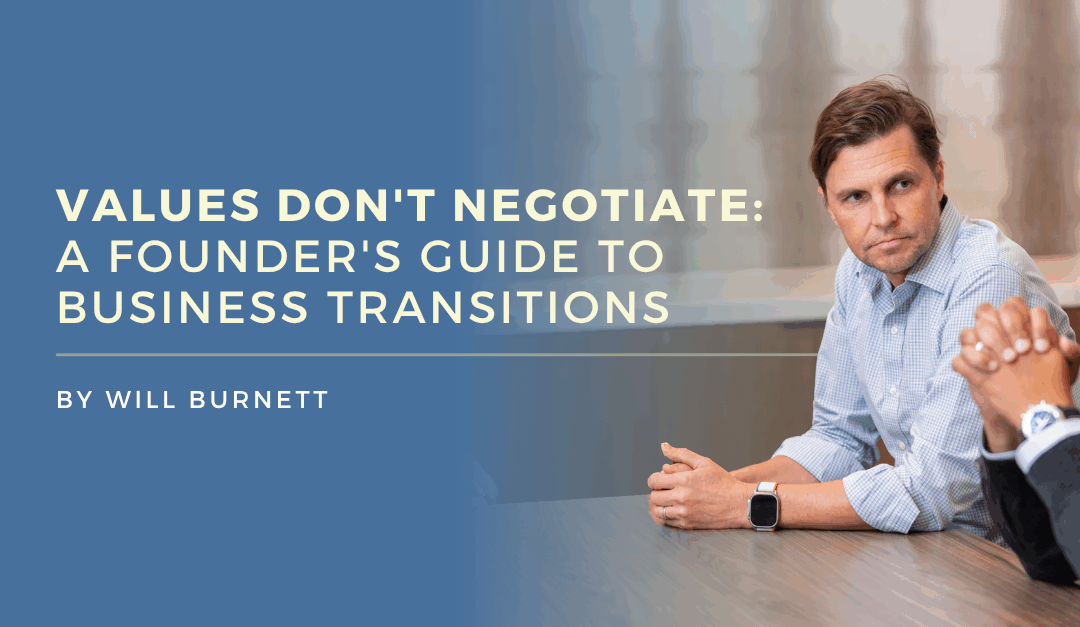Will Burnett, Co-Founder, Owner Resource Group
Here’s something I learned along the way: everything in your business can and should evolve, except the things that define who you are.
As founders of Owner Resource Group, my partners and I grew up watching our families build businesses from scratch. Those early experiences taught us that values aren’t negotiable, they’re what keep you anchored when everything else is shifting. Then we entered the private equity world and learned that flexibility isn’t just helpful, it’s essential for survival. We saw companies pivot strategies, change products, even reinvent themselves when markets demanded it. But we also witnessed what happened when businesses compromised on the fundamentals: how they treated people, what they stood for, why they existed in the first place.
When we started ORG, we were probably too naive to believe we could fail, and anyhow, too stubborn to let it happen. That combination of conviction and resilience? We see it in every business owner we partner with. It’s what got them this far, and it’s exactly what they need to protect as they grow.
The Test Every Founder Faces
Here’s the reality: if you’re successful enough to attract private equity interest, you’ve already proven you can adapt. You’ve survived market shifts, economic downturns, and probably a few near-death experiences that taught you more than any traditional education ever could.
But, when outside capital comes in, when growth targets perhaps get more aggressive, when everyone’s talking about “optimization” and “efficiency”, that’s when your values get their first real stress test.
And here’s what I’ve learned from watching dozens of these transitions: the companies that thrive are the ones that are willing to consider flexing everything except their core values.
What We Actually Mean by “Core Values”
I’m not talking about the poster on your conference room wall. I’m talking about the non-negotiables that got you here:
- How you treat your people when times get tough
- The quality standards you won’t compromise, even under pressure
- The way you communicate – especially when there’s bad news
- The lines you won’t cross, even for your biggest opportunity
These aren’t feel-good concepts. They’re your competitive advantage, disguised as principles.
What Successful Transitions Get Right
The most successful transitions I’ve witnessed share a common pattern: founders know exactly what to hold onto and what to let evolve.
They embrace change where it creates value (bringing in specialized expertise they don’t have in-house, for instance), not out of pressure, but because it makes sense. And they protect what matters, not out of stubbornness, but because those are the principles that define who they are.
The best founders I’ve partnered with understand this instinctively. They’re adaptable everywhere except where it counts most.
How We Actually Do This at ORG
When we partner with a company, we’re not coming in to fix what’s broken with your values, we’re coming in to amplify what’s already working.
Our approach is simple:
- Trust first: We assume you know your business better than we do (because you do)
- Transparency always: Bad news doesn’t get better with time
- Flexibility in everything: Except the things that define who you are
- Collaboration, not takeover: Your team built something valuable; we’re here to help them build more
Too many good companies lose their way because someone convinced them their values were “inefficient” or “not scalable.”
The Question That Changes Everything
Here’s a question that you should ask yourself before considering a private equity partner:
“What are the things about your company that you’d never trade for growth, even if it meant leaving money on the table?”
If you can’t answer that immediately, I’d recommend defining this before considering a business transition.
If you can answer it, but you’re not sure your potential partner respects those boundaries, keep looking.
The Bottom Line
Your business is going to change. Market conditions will shift. Strategies will evolve. That’s not just okay, it’s necessary. But the principles that got you here, the way you treat people, the standards you hold yourself to, those shouldn’t be negotiable.
Because when the spreadsheets are forgotten and the metrics fade, what endures is the character you showed when it mattered most.
Make sure it’s the legacy you want to leave.
Will Burnett is Co-Founder of Owner Resource Group.

